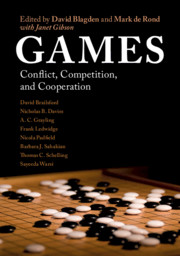Book contents
- Games
- The Darwin College Lectures
- Games
- Copyright page
- Dedication
- Contents
- Figures
- Notes on Contributors
- Acknowledgements
- Introduction Games: The Spectrum of Conflict, Competition, and Cooperation
- 1 Personal Principles in the Political Game
- 2 The Game of Crime and Punishment
- 3 Wittgenstein's Games
- 4 Games in Sports
- 5 Losing the ‘New Great Game’
- 6 Games for the Brain
- 7 Games Animals Play
- Afterword The Game Theory of Conflict
- Index
3 - Wittgenstein's Games
Published online by Cambridge University Press: 26 October 2018
- Games
- The Darwin College Lectures
- Games
- Copyright page
- Dedication
- Contents
- Figures
- Notes on Contributors
- Acknowledgements
- Introduction Games: The Spectrum of Conflict, Competition, and Cooperation
- 1 Personal Principles in the Political Game
- 2 The Game of Crime and Punishment
- 3 Wittgenstein's Games
- 4 Games in Sports
- 5 Losing the ‘New Great Game’
- 6 Games for the Brain
- 7 Games Animals Play
- Afterword The Game Theory of Conflict
- Index
Summary
Wittgenstein twice thought that he had solved all the problems of philosophy, by explaining how language acquires meaning. The first time, he said that it does so by its relation to the world; the second time, by its relation to itself. To this second suggestion, the concept of ‘games’ is central. In this chapter, I explain and discuss Wittgenstein’s contributions both to the substance and to the ethics of the philosophy of language with ‘games’ focally in view.
- Type
- Chapter
- Information
- GamesConflict, Competition, and Cooperation, pp. 41 - 60Publisher: Cambridge University PressPrint publication year: 2018

